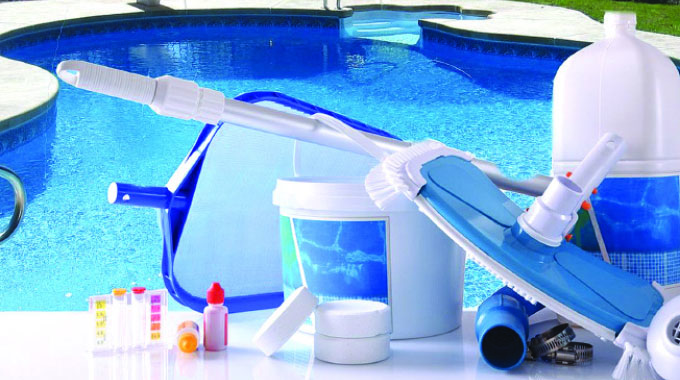Swimming pool care tips

Home & Garden
Crystal clear swimming pools are often at the centre of summer fun. And while we put a lot of emphasis on wearing sunscreen and preventing drowning during water activities, you probably don’t think about the chemicals that go into pools.
Sure, you might be familiar with the smell of chlorine, but if the pool cleaning duties don’t fall on you, you’re probably not researching how pool chemicals could affect your health.
Pool chemicals like chlorine and bromine keep you safe from germs and bacteria. When used correctly, they help prevent outbreaks and other potential health problems. However, with recent shortages, many people have resorted to mixing things into pools that shouldn’t be. Other problems include mishandling or not storing pool chemicals correctly.
Emergency medicine physician Baruch Fertel, MD, offers some helpful tips for managing pool chemicals so you can stay safe whether you’re cleaning or enjoying the pool.
“It’s a great time of year,” says Dr Fertel. “People have opened up their pools so their friends and family can cool off from the hot weather. However, everyone needs to maintain some basic safety rules when it comes to pool chemicals and equipment.”
The importance of pool chemicals
The CDC refers to the chlorine and pH level of your pool as your “disinfection team.” These two elements serve as the first defense against germs that can cause illness. While chlorine is very effective, it doesn’t work instantly. And when things like dirt, skin cells, sunlight and even fecal matter end up in a pool, they can reduce chlorine levels.
The pH level determines how acidic or basic your pool water is. If the water has a high pH, it’s harder for chlorine to kill germs. Another thing to keep in mind is that your body can have a pH between 7.2 and 7.8. If pool water isn’t in this pH range, you’ll be able to tell because your skin and eyes will become irritated. To ensure this doesn’t happen to you or your guests, you’ll need to regularly check and adjust the chlorine and pH levels.
Other common symptoms of irritation or illness include:
Ear pain.
Trouble breathing.
Cough or congestion.
Should you be able to smell chlorine?
No, you shouldn’t be able to smell chlorine. According to the CDC, a well-maintained pool should not have a strong chemical smell. When you encounter that strong “chlorine smell,” you’re getting a whiff of what are known as “chloramines.” Chloramines are formed when things like sweat, urine, dirt, skin cells and even poop mix with chlorinated water.
How to prevent chloramines
After reading the last section, you probably don’t want to get into a public pool again. But there are things that you can do at home to prevent chloramines.
If you have diarrhoea, don’t swim. The same goes for the little ones.
Always use the restroom before getting into the water and take bathroom breaks as needed.
Take a shower before getting into the pool. Rinsing off in the shower for just a minute can help remove most of the dirt or anything else on your body.
Wear a swim cap.
Don’t pee in the water.
Carefully add chemicals to pool water
Dr Fertel says there’s a right and wrong way to do it. When you think about it, it’s no different than adding detergent to a washing machine.
“When you’re adding chemicals to a pool, always add the powder to the water, not the water to the powder. When even a little bit of water gets on some pool chemicals, something called ‘wetting’ occurs. Chemical wetting can cause a dangerous reaction and combustibility. That’s why it’s really important to add pool chemicals to the water.”
Store pool chemicals in a dry area
You never want to store chemicals in a damp area. Dr Fertel strongly recommends keeping them in a very dry space and away from any leaky containers.
“Pool chemicals should be stored in a dry area. Make sure that there are no other chemicals or items on the shelves above that could potentially drip down on them. The containers that the chemicals are in should also be sealed tightly.” – Clevelandclinic.org








Comments